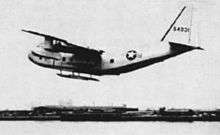Stroukoff Aircraft
| Industry | Aircraft manufacture |
|---|---|
| Fate | Dissolved |
| Founded | 1954 |
| Founder | Michael Stroukoff |
| Defunct | 1959 |
| Headquarters | Trenton, New Jersey, United States of America |
| Products | YC-134 |
Stroukoff Aircraft was an American manufacturer of experimental military transport aircraft, established in 1954 by Michael Stroukoff. Successor to Chase Aircraft, the company specialised in developing advanced variants of the C-123 Provider; however, none of the company's designs attracted a production order, and the company folded in 1959.
Founding
During the late 1940s, Russian emigré Michael Stroukoff designed the XG-20 for Chase Aircraft, the largest glider ever built in the United States.[1] Modified into the C-123 Provider,[2] the aircraft had won a contract for production from the United States Air Force, 49% of Chase being acquired by Kaiser-Frazier to produce the aircraft at the latter company's Willow Run facility.[3] However, a scandal involving Kaiser resulted in the C-123 contract being cancelled;[4] with Kaiser having bought out the remainder of Chase and dissolving the company,[3][5] Stroukoff acquired the company's facilities at the Trenton airport, and established his own company to continue development of the C-123 design.[3]
YC-123D and E

Stroukoff's first advanced variant of the C-123 design was the YC-123D, modified from the XC-123A prototype - itself a modified XCG-20[6] - which had been the first jet transport to fly in the United States.[7] Flying in 1954, the YC-123D was fitted with the twin piston engines of the normal C-123 family, and was equipped with a boundary layer control (BLC) system.[1] The BLC diverted air from the engines to blow over the wing, increasing lift and reducing the aircraft's takeoff and landing distances.[1]
The following year, Stroukoff modified a C-123B into the YC-123E, fitted with Stroukoff's own Pantobase landing gear system.[3] The Pantobase system allowed the aircraft to land on any reasonably flat surface - land, water, or snow[1] - and proved remarkably successful in testing.[8]
YC-134

Following its successful trials, the YC-123E was further developed into the YC-134.[3] Designated MS-8-1 by the company,[9] the YC-134 featured both boundary layer control and the Pantobase landing gear;[10] in addition, the aircraft was fitted with more powerful engines, tailplane endplates, additional wheels for the main landing gear, and an improved fuel system.[11]
Intended for Arctic use,[12] the YC-134's test flight program proved successful.[9] However, its increase in performance over that of the C-123 was considered inadequate; in addition, there was simply no need for an additional piston-engined transport by that time, and the proposed production contract was cancelled.[3] With the failure to gain any contracts for production of its designs, Stroukoff dissolved the company in 1959.[3][N 1]
References
- Notes
- ↑ Stroukoff Aircraft was invited to tender a design for the U.S. Navy's patrol aircraft requirement that produced the Convair XP6Y, but declined to do so, presumably choosing to concentrate on its Avitruc designs.[13]
- Citations
- 1 2 3 4 Sergievsky et al. 1998, p.128
- ↑ Andrade 1979, p. 87.
- 1 2 3 4 5 6 7 Pattillo 2000, pp.165-166.
- ↑ Life July 6, 1953, p.22
- ↑ "Kaiser To Close Chase Plant In New Jersey". American Aviation, Volume 17 (1953), p.15.
- ↑ Gunston 1980
- ↑ Rolfe and Dawydoff, 1978.
- ↑ The Aerospace year book, Volume 39 (1958), p.115.
- 1 2 The Aerospace year book, Volume 39 (1958), p.307.
- ↑ Jane 1958, p.364.
- ↑ "C-134 Pantobase" GlobalSecurity.org. Accessed 2010-12-06.
- ↑ Air Force magazine, Volume 40 (1957), p.93.
- ↑ U.S. Navy (1957). Aer-EV-2 424]. P6Y Design Competition. At alternatewars.com. Accessed 2011-01-18.
- Bibliography
- Andrade, John (1979). U.S. Military Aircraft Designations and Serials since 1909. Leicester, UK: Midland Counties Publications. ISBN 0-904597-22-9.
- The Editors (July 6, 1953). "Kaiser Cancellation: Henry J's 'boxcars' cost too much for Air Force". Life. TIME Inc. 35 (1). Retrieved 2010-11-29.
- Gunston, Bill, ed. (1980). The Illustrated Encyclopedia of Commercial Aircraft. New York: Exeter Books. ISBN 978-0-89673-077-9.
- Jane, Fred T. (1958). Jane's All The World's Aircraft. London: Sampson Low, Marston & Co. ASIN B000W8DRPK.
- Pattillo, Donald M. (2000). Pushing the Envelope: The American Aircraft Industry. Ann Arbor, MI: University of Michigan Press. ISBN 978-0-472-08671-9. Retrieved 2010-11-26.
- Rolfe, Douglas; Alexis Dawydoff (1978). Airplanes of the World. New York: Simon & Schuster. ISBN 978-0-671-22684-8.
- Sergievsky, Boris; Allan Forsyth; Adam Hochschild (1998). Airplanes, Women, and Song: Memoirs of a Fighter Ace, Test Pilot, and Adventurer. Syracuse, NY: Syracuse University Press. ISBN 978-0-8156-0545-4.
External links
![]() Media related to Stroukoff aircraft at Wikimedia Commons
Media related to Stroukoff aircraft at Wikimedia Commons